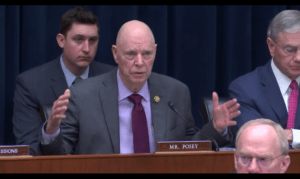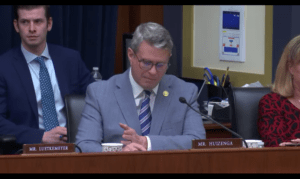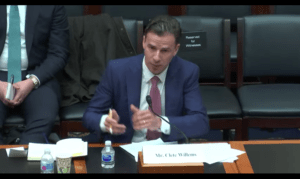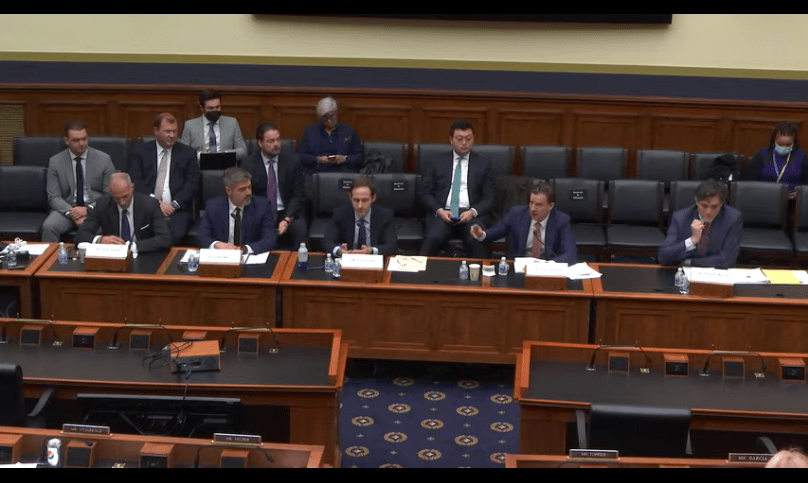On Tuesday, Feb. 7, the House Financial Services Committee held a hearing titled “Combatting the Economic Threat from China”. It took place just days after the U.S. Air Force shot down a Chinese surveillance balloon Washington dubbed the “spy balloon”. They said it was not the first time this had happened, but it was the first time the government took action against it. Democrats and Republicans both chastised the Biden administration’s slow response. But the immediate takeaway from the roughly four-hour hearing was that no matter how riled up Washington gets over China, the country’s enmeshed ties with Wall Street and businesses large and small are really putting policymakers in a bind.
 “China’s economic dominance will lead to military dominance soon,” said Rep. Bill Posey (R-FL-8).
“China’s economic dominance will lead to military dominance soon,” said Rep. Bill Posey (R-FL-8).
Posey listed other concerns, such as land ownership by Chinese companies in the U.S. “Does anyone know how much land China owns in the United States?” (People on the panel chuckled, and stayed silent). “When running for president, Biden said China was not competition for us. What do you think are the ways China is in competition with us?” Posey asked specifically to Clete Willems, partner at lobby firm Akin Gump Strauss Hauer & Feld.
Willems, who was frequently questioned by members of the Committee last week, did not mince words: “If you look at what they are doing from an economic point of view, that is a threat the U.S. leadership needs to address.”
The hearing examined risks to U.S. interests posed by China’s economic and geopolitical actions. Congress asked the five witnesses for advice on actions the U.S. can take to mitigate China risk through a series of policy questions related to investment screening, export controls and sanctions, and trade agreements.
On the trade front, some members of Congress like Rep. Gregory Meeks (D-NY-5) lobbed softballs at witnesses about trade. “We are isolating ourselves on trade,” he said. “If we are not in Asia, China will trade with them and we will be isolated. What should we do at this time?” he asked, and the answer from the witnesses was always – more trade deals, and resuscitating the Trans-Pacific Partnership, a non-starter for the White House.
There was a consensus that the U.S. had to work with allies on export controls. Restricting certain computer hardware components to China would not work if Japan or India can just sell the same thing to them instead.
Here is a glimpse into those conversations from Tuesday.
China and U.S. Capital Markets
 Rep. Bill Huizenga (R-MI-4): Can China provide a safe climate for U.S. investors? How can our regulators make it so that our investors understand what they are investing in?
Rep. Bill Huizenga (R-MI-4): Can China provide a safe climate for U.S. investors? How can our regulators make it so that our investors understand what they are investing in?
Panelists just said investment funds need to be transparent. That was that.
Huizenga then asked about the Public Company Accounting Oversight Board (PCAOB), which for years had tried and failed to get Chinese companies listed on the NYSE and Nasdaq to allow for third-party audits. China declared state secrets. But even publicly traded companies from Brazil that are state-owned, like oil firm Petrobras, complied with the PCAOB. China has not. So PCAOB gave one last round of negotiating a try to get the Chinese to comply.
Rep. Huizenga: Seems the whole thing at the PCAOB is being run by Beijing. We were quick to remove Russia from our exchanges but we are still here waiting for China to abide by PCAOB rules.
Rep. Ralph Norman (R-SC-5): Do you believe that the PCAOB has been successful in putting safeguards in place, so investors who are investing in these companies are protected from securities fraud? Or do we need to put some teeth into this?
Clete Willems: Let’s take the PCAOBs word for it when they said they accessed Chinese papers, randomly, in the fall. We are right to wonder if China is finally saying they will play by the audit rules, or not. Congress needs to do rigorous oversight over this now, and needs to make sure the PCAOB is giving them access to the information they have on China.
Note that last year, CPA sent a letter to the PCAOB asking questions on their audit practices, access, and approach to bringing the PRC into compliance. CPA holds a less optimistic view than that of Mr. Willems regarding the transparency our PCAOB was afforded and the veracity of their approval of Chinese firms. To read the full CPA letter, click here.
Rep. Andy Barr (R-KY-6): Isn’t it a good idea that we do not allow for capital flows to fund China defense contractors, and I mean also through venture capital and private equity, not just Wall Street?
Barr introduced H.R. 760 on Feb. 2, which imposes sanctions on Chinese military companies and tech companies that conduct surveillance. Some of these restrictions already exist.
Willems: Yes, you need a statutory basis for these actions and Congress needs to work on that in a very thorough way. I believe your bill addresses it and we can work on the technical aspects of it.
Barr said that the current White House Executive Orders against China military companies do not address U.S. funding in civil-military companies (like shipbuilders), or defense contractors via private equity and venture capital.
CPA has long advocated for the expansion of this executive order, its wider use by the Treasury Department, and it being codified. CPA sent this letter to Secretary of the Treasury Janet Yellen in 2022 on the topic.
Rep. John Rose (R-TN-6): There is about $1 trillion in China securities listed in the U.S. Do you think U.S. investors have adequate info to understand their exposure to Chinese capital markets and the risks associated with them?
Willems: We don’t inherently not want China in our markets. It gives our markets more depth. But in general, I would say investors do not know what they are getting into. Still, investors need to make their own decision.
Willems basically stated that investors don’t have the information they need to make fully informed choices. Investors are not protected, especially in the Shanghai and Shenzhen stocks proliferating in American mutual funds today. Those companies listed there do not come with the same transparency or investor protections as the companies listed here.
Rep: Erin Houchin (R-IN-9): How can we mitigate risks in China stocks, but keep a strong open market?
Tom Feddo, Founder/Principal, The Rubicon Advisors LLC: I tend to be a little shy of expanding government, so whatever we do has to be based on fact and on a rational basis. I’m not sure we completely understand what we are trying to stop. I don’t dispute that there is a national security risk and there are gaps in capital market sanctions that need to be closed, like an expansion in the CMIC list…but we need to be clear what the risk is and not create a new government agency for this. (As Biden has proposed, and Houchin pointed out)
“Feddo nicely dances around the expansion of government authority and seems unaware of current events. The ‘what’ we are trying to stop is very clear: the support of the United States for the CCP in tacit ways vis-a-vie the U.S. taxpayer and investment institutions pouring trillions of dollars into the hands and enterprises of the CCP. Why? Because the CCP is a strategic risk to America, we are told. We must not enable China to expand their control of key natural resources, and have an outsized influene in global institutions. If the genocide in Xinjiang, espionage, illegal island building in international waters, debt-trap diplomacy in the name of the Belt and Road Initiative that has pillaged countries and threats to Taiwan are not enough to make people understand what we are trying to stop, then I am not sure what will convince them. The U.S. should be trying to stop the supporting and financing of these companies, at the least.” – Robby Smith Saunders, Vice President of National Security of the Coalition for a Prosperous America.
Rep. Bryan Steil (R-WI-1): I think we can all agree that Americans should not be financing military companies, but existing restrictions have gaps. How do we close them?
 Willems: The one Executive Order (EO) by Trump and the one EO by Biden say US the government should identify companies that are affiliated with the Chinese military and ban U.S. investments. The problem is that that does not apply to a lot of other ways to invest, including bonds or even loans, so Congress can come in and fill that gap. Right now, these targets are the tech surveillance and military equipment companies but there are probably other defense sectors you can target to fill in those gaps.
Willems: The one Executive Order (EO) by Trump and the one EO by Biden say US the government should identify companies that are affiliated with the Chinese military and ban U.S. investments. The problem is that that does not apply to a lot of other ways to invest, including bonds or even loans, so Congress can come in and fill that gap. Right now, these targets are the tech surveillance and military equipment companies but there are probably other defense sectors you can target to fill in those gaps.
Rep: Andy Ogles (R-TN-5): We spend nearly a trillion dollars on our own defense, and China gets a trillion more from Wall Street. What might you envision we do in Congress so we are not funding carriers and battleships that can be used against our allies?
Willems: First is the CMIC list. Plug in all the gaps and all the financing that can go to them. The other is on export controls. They can be a tool to prevent our technology that can be used to support that exact same development. The way you do this is critical. It has to be coordinated because if you don’t work with allies, then they can just have their companies sell to China instead.
CPA agrees with this, says Smith Saunders, and adds that the U.S. government also needs to stop procuring items from China – especially defense articles. “A lot more additions need to be made to the NS-CMIC List,” she said after viewing the meeting last week. CPA has called out specific companies to add such as those connected to and financing China’s shipyards and shipbuilding (like BlackRock and Vanguard), as well as hypersonic weapons development.
On Supply Chain Risks
Rep. Josh Gottheimer (D-NJ-5): What would a CHIPS 2.0 bill look like?
CHIPS is the acronym for the popular semiconductor bill, which provides tax incentives to companies like Intel to produce chips of all types in the U.S. The trend has been moving to Asia. Semiconductors are consistently a top five U.S. export item. Whereas other top five export items, like pharmaceuticals and automobiles, are also a top five import item.
“The bills that Congress has passed over the last two years that foster investment in infrastructure, computer chips and clean energy are essential to our success. I would break investments into two pieces – one is tech, the other is the supply chain reliance piece. On the supply chain resilience piece, we have done a lot on critical minerals related to clean tech. But another area is pharmaceuticals. Not high-end pharmaceuticals, but where we have some supply chain vulnerabilities (in generics). The administration should take a comprehensive review to look at those vulnerabilities to get ahead of the things that we don’t know that we don’t know yet.” – Peter Harrell, former Senior Director for International Economics and Competitiveness, National Security Council and National Economic Council
Gottheimer also called out the Food and Drug Administration, speaking specifically about adulterated medical products. “We are not doing enough to crack down against foreign producers of adulterated medical products. FDA needs more tools to go after this, especially counterfeit drugs,” he said.
“We import more from China than anywhere else on the globe. There are some benefits. Cheaper goods for consumers. And behemoth profits for corporations. We have a schizophrenic relationship with China. Is that a bad word to describe it?” asked Rep. Emanuel Cleaver (D-MO-5). The testimony crew went quiet for a while. Then Harrell spoke up.
“Personally, I think what we need to move to on a conceptual level is a much more managed trade relationship,” he said. “They are heavily managed on their side of the economy. They have all kinds of distorting subsidies and grew in part due to IP theft. We are just going to have to manage trade with them so they don’t undercut our prosperity with all the things they are doing over there.”
But then Willems of Akin Gump threw the House a curve ball, bringing up the status quo reasoning for the kids’ glove, one step forward one step back, relations with the CCP.
“The Chinese market is really important for a lot of our companies,” Willems said. “If we are going to be globally competitive, we need to be in China. Our sales in China are like subsidizing our continued innovation. That’s a good thing.”
Rep. Roger Williams (R-TX-25): We need a more local supply chain. What can we do to incentivize companies to move out of China?
Willems: We need a competitive tax rate and regulations. And lastly, I’d look at friend-shoring first.
Overall, the Committee is waiting on the final verdict of China’s compliance with the PCAOB new rules for U.S.-listed companies. It appears that both political parties want to plug the gaps in existing export control measures against Chinese defense contractors, including the possibility of expanding the number of companies that will face restrictions.
China-centric supply chain woes were a concern, but only Congressman Williams of Texas brought up reshoring and that was quickly met with the ‘friend-shoring’ alternative, which really means everyone that is not China, Russia, Belarus, North Korea, Cuba, and Iran.
Rep Brad Sherman (D-CA-32) spoke in the middle of the hearing, but had what was arguably one of the best quotes of the day. Sherman has been a relative stalwart on this issue, at least rhetorically, in China-related hearings for the last two years.
“The Rust Belt is because of China. When Congress gave China Most Favored Nation status and then let them into the World Trade Organization, China was then a slumbering giant. Now it is much more. We need to look at tariffs,” Congressman Sherman said. “We definitely need to deprive China of MNF if it invades or blockades Taiwan. We need to require every corporation to assess their risk if there was a breakdown in the China relationship. I’m not saying it will happen, but what if it does? They need to create resiliency so they will be less desperate, instead of telling us not to do anything to China. We need an automatic 25% tariff on all China goods. China hands out access to its markets like I hand out dog treats to my pets. I represent Hollywood. Let me give you an example of my constituent’s issues with China. Hollywood is told they can only get 40 movies into China each year. That means if you make a movie critical of China, that doesn’t go to China…but it also means that none of your movies are going to China. They control it and do it with lobbyists, and that means China can control what Congress does. We need a tariff on Chinese goods. Let’s collect the funds and give it to companies that were unfairly treated because of China. How about that idea? I don’t know. Just a proposal.”
Chinese Companies Build Factories in Mexico to Exploit “Friendshoring”













